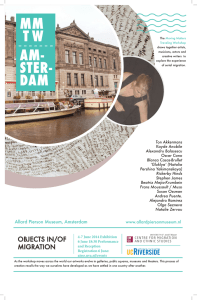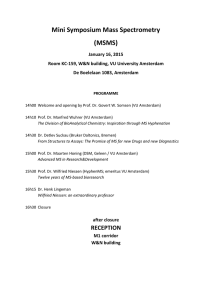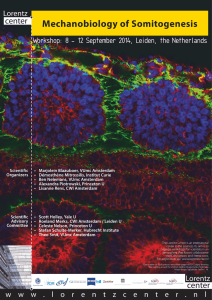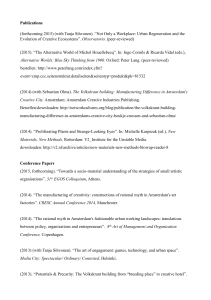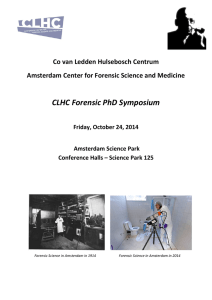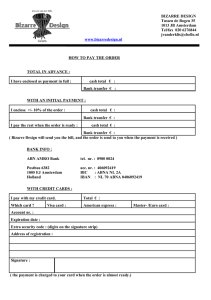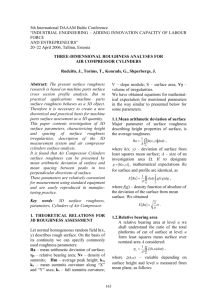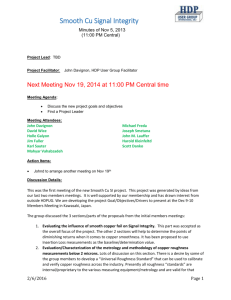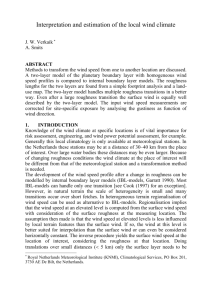Roughness Measurement
advertisement
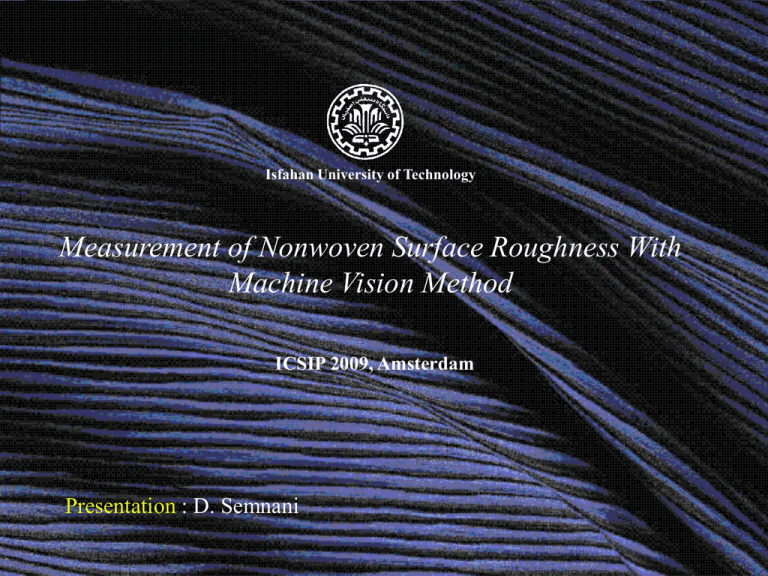
Isfahan University of Technology Measurement of Nonwoven Surface Roughness With Machine Vision Method ICSIP 2009, Amsterdam Presentation : D. Semnani ICSIP 2009, Amsterdam Image Processing in Textile Engineering •Online Quality Control of Textiles • Detection Of Yarn And Fabric Faults • Classification of Products • Measuring Uniformity of Fibrous Structures • Determination of Woven And Nonwoven Fabrics Surface Roughness 1/13 ICSIP 2009, Amsterdam Spunbond Nonwovens • Application & End Use • Importance of Surface Friction 2/13 ICSIP 2009, Amsterdam Measurement of Textile Surface Roughness • Conventional Measurement Advice • Disadvantages 3/13 1/12 ICSIP 2009, Amsterdam Our Method First :Simulate An Ideal Surface • Complete and Regular Sine Roughnesses • Minimum Sensible Amplitude and Wave Length 2 :Compare of Simulated Ideal Surface with Samples Surface Profile 3 :Surface Roughness Factor determination 4/13 4 :Compare Friction Coefficient With Evaluated Surface Roughness Factor Finite element model of human finger ICSIP 2009, Amsterdam Simulating Ideal Surface • Mathematically Aspect of an Complete sine Surface z 0.0025 sin( 2x / a).sin( 2y / b) a b 1 mm A 0.0025 mm • Adjust the Confine of Amplitude between 0 to 0.0025 mm Rather Than -0.00125 to 0.00125 mm z 0.00125 sin( 2x / a).sin( 2y / b 0.00125 5/13 ICSIP 2009, Amsterdam Plotting The Simulated Ideal Surface 6/13 ICSIP 2009, Amsterdam Image Processing of Sample Surfaces ••Sample PlottingProperties the Surface Profile Of Samples • Image Acquisition of Sample Surfaces •Conversion and Processing RGB Image 7/13 Grayscale Image Gaussian and Wiener Filtering Histogram Equalization ICSIP 2009, Amsterdam Extracted Parameters From Preprocessed Sample Images and Simulated ideal Surface N : Number of picks in the surface T : Variance of distance between picks from point (0,0) in image matrices E : Volume of surface profile Id : Dispersion ratio (presented by Pourdeyhimi) V : Variance of gray scale values of image 8/13 ICSIP 2009, Amsterdam Definition of Normalized Factors For Compare of Ideal And Sample Surfaces s : index of simulated surface r : index of generated profile from real surface Kt Ts Tr Ke Ts Kv 9/13 Vs Vr Vr E s Er Kn Es K Id I ds I dr I ds Ns Nr Ns ICSIP 2009, Amsterdam And Finally : Definition of Surface Roughness Factor 1 Rs K n K t K e K I d K v 5 10/13 ICSIP 2009, Amsterdam Determination The Surface Friction Coefficient of Samples Friction Standard Test ASTM D1894 11/13 ICSIP 2009, Amsterdam Regression Between Surface Roughness Factor (Rs) and Surface Friction Coefficient of Samples R’s = 1.027 Rs – 0.023 New Roughness Factor with effect of friction 12/13 μ = 1.027 Rs – 0.023 ICSIP 2009, Amsterdam Conclusion Advantages of This Method • Present an appropriate roughness factor which originally implies both elements of roughness : 1. Point by point consideration of surface roughness height compare with line by line height measurement in KES 2. Consideration of fabric surface friction in roughness factor determination Final Thanks for your Attention
